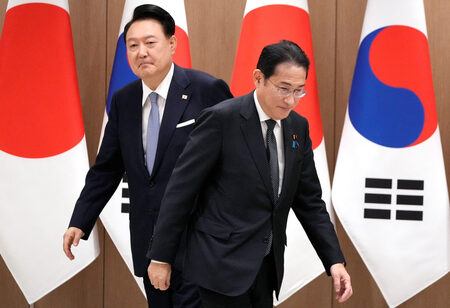
Japan, South Korea to Deepen Future-Oriented Cooperation


Japan and South Korea marked the 60th anniversary of the normalization of their diplomatic relations. The two countries once interacted as an industrialized country and a developing country, but they have now become equal partners, on par with each other in economic terms.
They are also facing common challenges, including the drastically changing international situation and populations that are rapidly graying with chronically low birthrates.
It will be essential for Japan and South Korea to deepen their future-oriented cooperation while carefully dealing with historical issues that could trigger conflicts.
“There are many fields in which we can cooperate by sharing knowledge. We want to further broaden the areas for Japan-South Korea cooperation and pass the baton of cooperation to future generations,” Prime Minister Shigeru Ishiba said at a ceremony in Tokyo to commemorate the 60th anniversary of the normalization of diplomatic ties. Ishiba referred to regional revitalization and measures to address the low birthrate, issues on which he is focusing.
Also Read: A Lot of Weightlifting Awaits Lip-Bu Tan, But is Intel Ready for Him?
The prime minister called on South Korea to work together on issues where the two countries share common interests, apparently in consideration of the fact that South Korea’s President Lee Jae-myung, who took office earlier this month, is promoting a pragmatic approach by focusing on practical benefits.
After the Korean War, South Korea ranked among the world's poorest nations. Still, it succeeded in attaining significant economic growth, referred to as the “Miracle on the Hangang River,” partly because of the restoration of diplomatic relations with Japan.
The Treaty on Basic Relations between the Republic of Korea and Japan, along with The Agreement on the Settlement of Problems regarding Property and Claims and on Economic Cooperation between the Republic of Korea and Japan, were both signed on June 22, 1965. Through these agreements, the two nations recognized that the matter of claims between them had been resolved, on the condition that Japan would offer South Korea economic assistance totaling $500 million — roughly twice South Korea's national budget at that period — laying the groundwork for future Japan-South Korea relations.
At present, both nations possess a nearly equivalent gross domestic product per capita. Within the semiconductor industry, Japan excels in materials and manufacturing machinery, whereas South Korea specializes in production, resulting in growing interdependence between the two nations.
Also Read: Spacetech Startups Propelling Modern Space Innovation
Japan and South Korea face a similar issue with inadequate working conditions for women, regarded as a contributing factor to the low birth rates in these nations. In the Global Gender Gap Report published by the World Economic Forum, Japan occupied the 118th position out of 148 nations, whereas South Korea was placed 101st.

